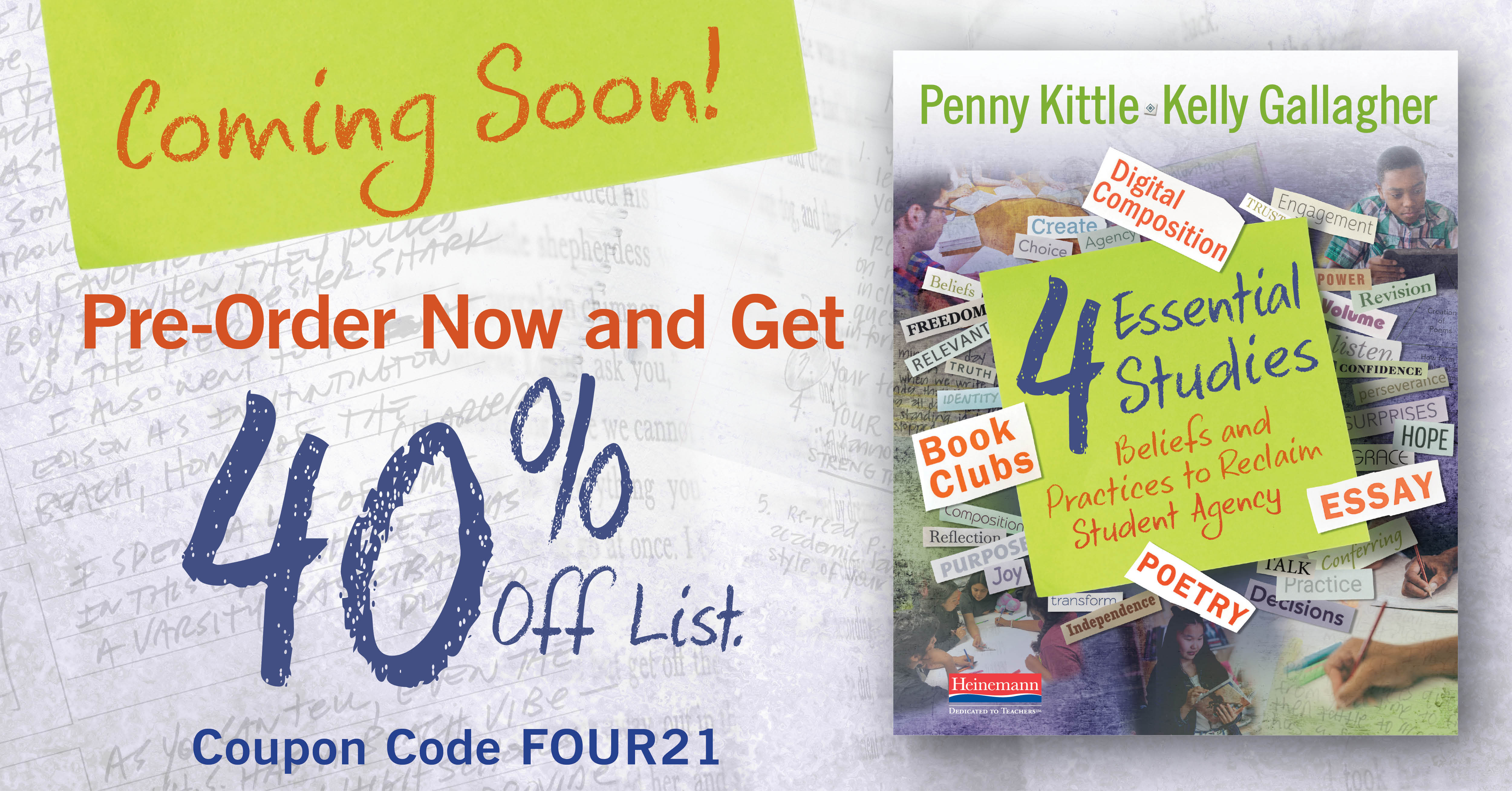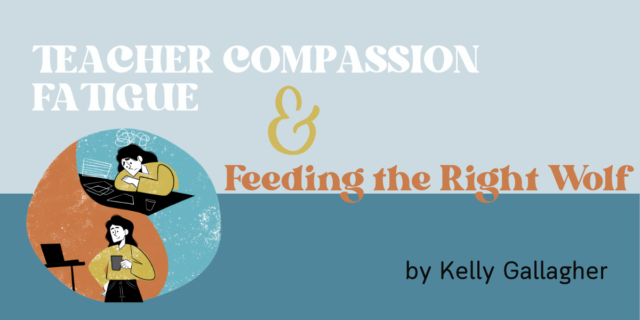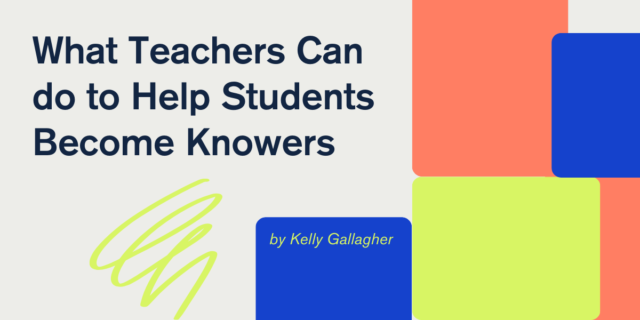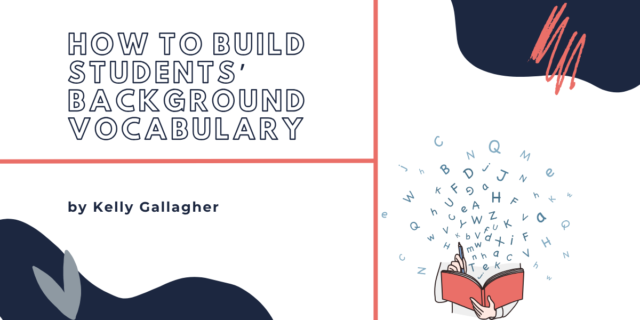
The following is an excerpt from Four Essential Studies: Beliefs and Practices to Reclaim Student Agency by Penny Kittle and Kelly Gallagher
What is it about digital composition that changes teaching and learning? So many things: the opportunity to create—the wide-open world of possibility and vision; the natural collaboration that emerges as they share bits of their movies with each other and listen to feedback; the curiosity they feel to not just consume media but also understand how it is created. And a fundamental truth: they know more about this than their teacher does. Students are faster to learn the tools they need and eager to experiment. Revision is a natural part of the process. As the classroom shifts to a place of collaborative, shared learning and productive talk, time gallops by.
Of the four units in Four Essential Studies, three are likely familiar to you: book clubs, essay writing, and poetry. We hope we have given you new ways to consider those studies, but it is unlikely that our thinking on those subjects has upended you. This unit might. Stay with us: we’ve stumbled along ourselves in learning how to lead students to create in digital media, but it has always ignited energy in our classrooms. Digital composition is where relevance and rigor meet.
The following is an excerpt from Four Essential Studies: Beliefs and Practices to Reclaim Student Agency by Penny Kittle and Kelly Gallagher
What is it about digital composition that changes teaching and learning? So many things: the opportunity to create—the wide-open world of possibility and vision; the natural collaboration that emerges as they share bits of their movies with each other and listen to feedback; the curiosity they feel to not just consume media but also understand how it is created. And a fundamental truth: they know more about this than their teacher does. Students are faster to learn the tools they need and eager to experiment. Revision is a natural part of the process. As the classroom shifts to a place of collaborative, shared learning and productive talk, time gallops by.
Of the four units in Four Essential Studies, three are likely familiar to you: book clubs, essay writing, and poetry. We hope we have given you new ways to consider those studies, but it is unlikely that our thinking on those subjects has upended you. This unit might. Stay with us: we’ve stumbled along ourselves in learning how to lead students to create in digital media, but it has always ignited energy in our classrooms. Digital composition is where relevance and rigor meet.
How many years have we been talking about a digital revolution that would transform education? And yet, so many classrooms have moved only in superficial ways. A student writes an essay on a computer instead of by hand, which, in the words of former president Barack Obama, adds only “a mask of tidiness to half-baked ideas” (2020, xiii). Classrooms remain lecture-centered, only students are now receiving information through PowerPoint presentations. Teachers are still posing questions, but students are now posting their responses on digital bulletin boards. Rather than helping to reimagine curriculum, technology has simply put a shine on the same units that we’ve been teaching for years.
We must change this.
What if we stopped simply revising last year’s units and shifted our gaze forward into the world of our students? What if we were to see emerging technologies as tools to help us redesign our curriculum? To more deeply understand the composition process? What if we took the advice of Jal Mehta, professor in the Harvard Graduate School of Education, who suggests we “discard the many topics that have accumulated like old souvenirs, while retaining essential knowledge and topics that spark joy” (2020)? There’s a thought! What if sparking joy became a central goal in our classrooms? Why is this a radical idea?
You might start “discarding old souvenirs” by sitting with colleagues and analyzing your department’s current curriculum. You probably will not see digital composition in your scope and sequence, and yet, this is what kids are reading the most outside of class. This realization is an invitation to ask critical questions: Why are we not teaching digital composition in a digital world? Kids are reading lots of novels and writing lots of essays—could one of these experiences be traded to make room for the creation of digital compositions? Would this new unit result in an increase in student engagement and revision practice both inside and outside of class?
And while you are in this reflective space, invite your students into these conversations. Ask them: Is your creativity being honored? Is the curriculum aligned with preparing you for life after high school? What do you need more of? Less of? We predict their responses will give you motivation to try something new.
Deviating from the standing curriculum will take courage, of course, but we see evidence of this kind of courage spreading across the country. For example, teachers are rethinking what students should be reading. How many whole-class texts in our curriculum are written by white men? Where can we make room for inclusive texts? Which books will reignite a lost passion for reading? Asking these questions is a central part of our evolution as teachers. We have to resist when others who do not know our students have decided what is best for them. We have to stop dancing to someone else’s song.
And we’d be remiss if we did not mention another benefit that arises when students create digital compositions: they develop compassion for others. Aurelio shows us what living with undocumented parents means. Christina reveals how hard it is to access treatment for the addiction of a beloved brother. Victoria recounts the life of her auntie, who was lost to COVID-19. Our students have stories only they can tell, and digital composition lifts their stories off the written page. It animates them. When shared, the stories create a connection—a sense of community. And when students share across schools, it humanizes and broadens their worldview, which, in an extremely fractured time, is more important now than ever.
We leave this chapter by introducing our dogs, Julius and Scout.
Though they are different in many respects, they share one characteristic: if you throw a ball, they will run and fetch it. Well, to a point. The key is to start with a short distance and work up to longer distances. Throw the ball thirty feet, and they will return it. Then throw the ball fifty feet, and they will return it. Then throw the ball one hundred feet, and they will still return it. But here is the thing: If you start by throwing the ball one hundred feet away, they will lie down at your feet and give you the “This is not happening” look. The key is to start small and gradually work toward the longer distance.
For many teachers, we suspect, a unit in digital composition may feel like retrieving a ball that has been thrown too far away. It’s way out there. You may be thinking, This is not happening. We understand this hesitation, but we encourage you to embrace your discomfort, to work through it. The rewards are great. If you give it a go, don’t throw the ball too far. Start small. Ask permission to pilot one idea. Perhaps remove the pressure from your students (and you) by eliminating grading from the equation. Also, don’t be too harsh on assessing your teaching performance. Grant yourself grace if the unit does not soar the first time you try it. We have found that it takes three to four attempts for a new study to really take hold. Remember this.
The good news is there is no guidance here. This newness—the uncertainty—is what makes this an exciting study. Bringing novelty into the curriculum is what keeps us and our students alert. When we embrace something new—when we take a risk—we send a powerful message about lifelong learning to our students. They continually reward us by showing what is possible when we break from standardization and embrace their creativity.
So go ahead. Throw the ball.
 Four Essential Studies will be available November 2, 2021. To pre-order and receive 40% off the list price, click here and use Promo Code FOUR21 at check-out.
Four Essential Studies will be available November 2, 2021. To pre-order and receive 40% off the list price, click here and use Promo Code FOUR21 at check-out.
 Kelly Gallagher (@KellyGToGo) taught at Magnolia High School in Anaheim, California for 35 years. He is the coauthor, with Penny Kittle, of Four Essentials Studies: Beliefs and Practices to Reclaim Student Agency, as well as the bestselling 180 Days. Kelly is also the author of several other books on adolescent literacy, most notably Readicide and Write Like This. He is the former co-director of the South Basin Writing Project at California State University, Long Beach and the former president of the Secondary Reading Group for the International Literacy Association.
Kelly Gallagher (@KellyGToGo) taught at Magnolia High School in Anaheim, California for 35 years. He is the coauthor, with Penny Kittle, of Four Essentials Studies: Beliefs and Practices to Reclaim Student Agency, as well as the bestselling 180 Days. Kelly is also the author of several other books on adolescent literacy, most notably Readicide and Write Like This. He is the former co-director of the South Basin Writing Project at California State University, Long Beach and the former president of the Secondary Reading Group for the International Literacy Association.

Penny Kittle teaches freshman composition at Plymouth State University in New Hampshire. She was a teacher and literacy coach in public schools for 34 years, 21 of those spent at Kennett High School in North Conway. She is the co-author (with Kelly Gallagher) of Four Essential Studies: Beliefs and Practices to Reclaim Student Agency, as well as the bestselling 180 Days.
Penny is the author of Book Love and Write Beside Them, which won the NCTE James Britton award. She also co-authored two books with her mentor, Don Graves, and co-edited (with Tom Newkirk) a collection of Graves’ work, Children Want to Write. She is the president of the Book Love Foundation and was given the Exemplary Leader Award from NCTE’s Conference on English Leadership. In the summer Penny teaches graduate students at the University of New Hampshire Literacy Institutes. Throughout the year, she travels across the U.S. and Canada (and once in awhile quite a bit farther) speaking to teachers about empowering students through independence in literacy. She believes in curiosity, engagement, and deep thinking in schools for both students and their teachers. Penny stands on the shoulders of her mentors, the Dons (Murray & Graves), and the Toms (Newkirk & Romano), in her belief that intentional teaching in a reading and writing workshop brings the greatest student investment and learning in a classroom.
Learn more about Penny Kittle on her websites, pennykittle.net and booklovefoundation.org, or follow her on twitter.


